What has changed in our relationship with video games over the last 25 years. And what has not.
Topic posted the 2022-05-16 in the category Histoire et TechnologieTopic updated: 2022-10-01
After more than 3 decades of history for the video games industry, it could be interesting to make some comparisons or to assess how things have evolved.
EDIT: after the publication of this post, I got a lot of comments on social media. Some of them were very interesting, others were like... most of you what see on social media: full of arrogance and intolerance to different points of view. I edited this post to include the interesting opinions that do not match with the original post.
The video game industry is old and young. Old because it has existed for four decades now. Young in comparison to the motion picture industry, which is one century old now, and the book industry which has been there for centuries.
This youth makes that we only get enough perspective today, enough distance to be able to assess how things have evolved and to make some conclusions. In an era where you expect to get things instantly and where opinions are sharp, it is not an easy task to produce such a work. However, let’s give it a try, a short one, through the opinion from a thirty-seven years old guy who have been playing at video games since 1992 on consoles and computers, trying to no fall into the “it was better before” trap.
Graphics do not really matter. Do they?
When I talk to older players (than me), and when I browse old tests and critics of video games of the 80’s, it looks like one thing was very, if not the most, important to the players eyes: fun. Video games were an entertainment (not exactly the same definition as we have today), a collective activity where the fun was the center of the attention. The visual aspect of the game came secondary or even tertiary – after the price, probably - as the limited power of the electronic did not let too much room for improvement, but above that, video games were not as popular or even affordable as today, so we had limited opportunities to make comparisons.
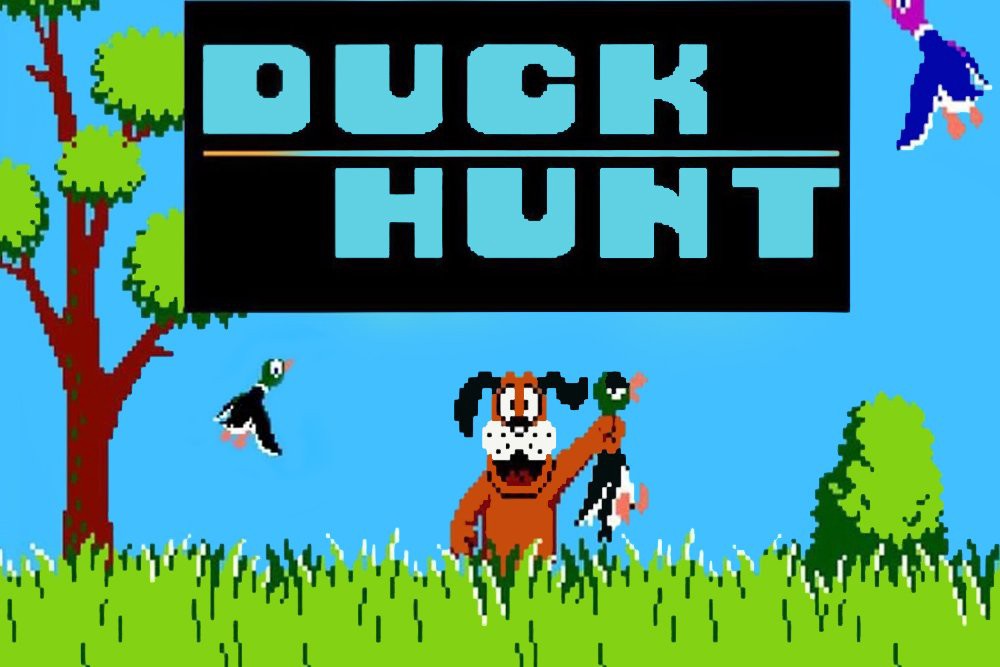
Above: Duck hunt on NES. Fun above eveything? Is it because we lacked of comparison? Or is it because it is 2D?
Things changed, at the very end of the 80’s, and they changed fast. They changed because of the talent of the developers who were always pushing limits away, competing in ingenuity to exploit the support they were working on as much as possible. The arrival of the 16-bits console and the Intel 386 microprocessor seems to have make the video game to enter in a new era. From this point, the visual aspect, always improving, became as important as the fun or the price of the game.
If you look back and read papers from these days, it seems to be clear. And things quickly accelerated with the appearance of 3D games, around 1994 and the release of the 32 bits consoles and with PC CPU closing to the 100Mhz frequency, with more power the capacity of the developers and game creators to express they creativity was less narrowed. From this era, the competition between games editors and console or 3D accelerators manufacturers became fierce, and the graphics of a game became a major criterion to rate it.
Today, we, the gamers, are the heirs of this era. The quality of the graphics seems to be the most important point in a game. As our generation mostly think in binary, we can throw any “It’s amazing” or “It’s so ugly” (or if we have a little bit of nuance: “It’s outdated”).
However, let’s not be assertive: there are still a lot of players, usually not the casual ones, who also consider playability, the scenario, and how much time you need to finish it, the presence of a multiplayer mode… to evaluate a game completely and fairly. I don’t know what the ratio is, but they are many. A lot. We could also add one more little thing: it is probably easier to get bad critics for a 3D game than for a 2D one, because expectations would be lowered.
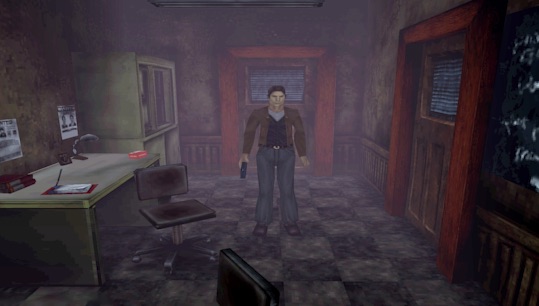
Above: Silent Hill on PSX. One of my favorite examples is how 32 bits-era game are today disregarded. “Oh, it is so ugly”, “They did not age well” for the more diplomats. For me, Silent Hill is a very great game, the scenario, the playability, the music, and the pixeled graphics are testimonials from that era and do not impact how I still enjoy this game. After all, could you really, badly, critic a 30’s movie because it is not shoot in HD? EDIT: some readers commented that they have never read such comment (about the "ugly" or "did not age well"). These comments suprised me a lot, since I have read them personnally a lot of times. Another comment, on hackernews, saif that the comparison with the HD movie is not appropriate.
Neither does the gameplay?
The same thing could be applied to the playability. Obviously, it is a major criterion to evaluate a game but sometimes I feel it overrated, the critics being too sharp and hiding all the positive points of game. Controls that could be sometimes awkward should do that fuss we read a lot. And worse, we can meet discrepancies in opinion from the very same people: for instance, I have read comments of people who considerer Grim Fandango as a masterpiece (I share their opinion) but regard Monkey Island IV as a poor game because of its control. For those who don’t know these games: the controls are the same, both games share the same engine. The reason of the contradictions in the comments from these gamers probably have their sources elsewhere, we will see that later in this post.
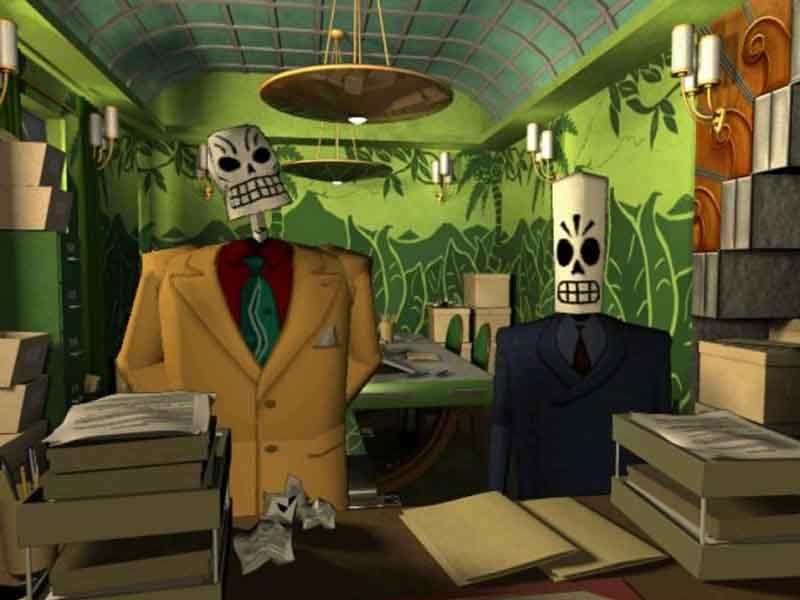
Above: Grim Fandango is an exquisite adventure about corruption into the land of death. The Mexican inspired ambiance is attractive.
The gameplay does not only include the controls, but also the gaming experience itself. For instance, I am still a fan of Panzer General II, one of the many hits produced by SSI in the 90’s. This strategy game has two characteristics that would become a flaw if this game would have been produced today: the isometrical view and the turn-based system, not compatible with the real-time 3D requirements for players today. It does not mean that it would not sell properly, but it would limit its success for sure, while it did not in 1997. EDIT: a reader said that the 3D requirements mentioned above are totally untrue, because there is still a lot of games that relie on isometric view, like Age of Empires for instance. I thank him/her for this pertinent remark, which added a bit of nuance to my opinion.
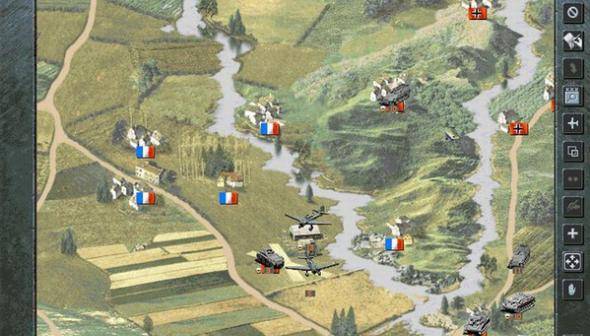
Above: if you are keen on wargames, Panzer General II is an excellent one, sometimes very difficult.
What the gaming experience has become
Today the gaming experience could be summed-up as follow.
• You go on steam.
• You buy and download a 4GB game.
• You play at it.
EDIT: for future readers, the example above requires a little bit of sense of humor, of irony.
Or:
- You go into the local store.
- You buy a DVD box format game, containing a single paper sheet and a DVD.
- You play at it.
- Or:
o You spend the double if you want to buy a “limited edition” containing a poster, some stickers, and a small book written by the scenarist of the game.
o You play at it and you have something on your shelves.
Back in the days things were very different: you went to your local store, you were facing a wall of big cardboard boxes with nice (and something lying) and attractive drawing, starting the engine of your imagination. Then, you bought the game. At home, you opened it, put it on your shelves along the others, and started to read the big user manual. Inside it, you found a complete description of the units, of the characters, the gameplay, tips, the game historical background, and words from the scenarist and/or the developers, directly talking to you, making the game experience starting sometimes hours before actually inserting the floppy or the disc into the drive. I have some memories of spending hours to read these books, before being able to play the game, letting me enough time to dream about it or imagine strategies.
Below: the holly times of the big user manuals. Some of them were even kind of small history books. EDIT: I got a very interesting comment from one of the readers. He/She mentioned that the big user manuals are no longer needed, mostly because now almost every game include some tutorial during the first minutes of the game.
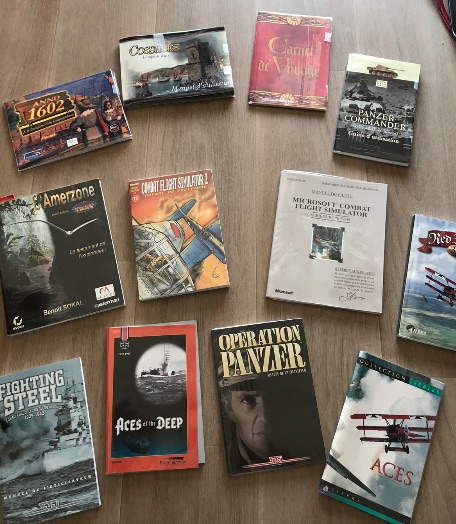
Games are now items of collection
Twenty-five years ago, we were not pilling-up games. A least for most of us, kids, teenagers, or adults. There was a huge second-hand market, and I personally spent a lot of money (sometimes months of allowance) into this business, exchanging finished games to get new ones. I didn’t like this trading, because it was sometimes unfair (storekeepers had to earn some money to live...), but, before the democratization of the CD-Recorder around 2000 (a good one costed around 300 EUR by then) it was the only way, with lending games from friends, to be able to enjoy 10% of all the hits that era was producing.
Today, that’s the opposite. We are pilling-them up. Virtually in Steam or GOG, or physically like I do with around one hundred of the big boxes and the same amount of DVD boxes, just for PC, plus all the games I have on console. They are like books: I like to see them; I have played at most of them (and will play at the others); they are not just stuff I buy impulsively like some people do. But the funning thing, is that prices for these old games have gone crazy. And you all know, prices for collection items are not related to the classical law of supply and demand: the prices are indexed to the availability of the game. It means that if a game is very rare, even if it is a very bad one, prices can reach the sky, even if nobody want to buy them (you can see announces on Ebay staying online for weeks). I have seen it for Sega Saturn’s games, and to add more to the irony, I remember some of these games being quite disregarded when they were released.
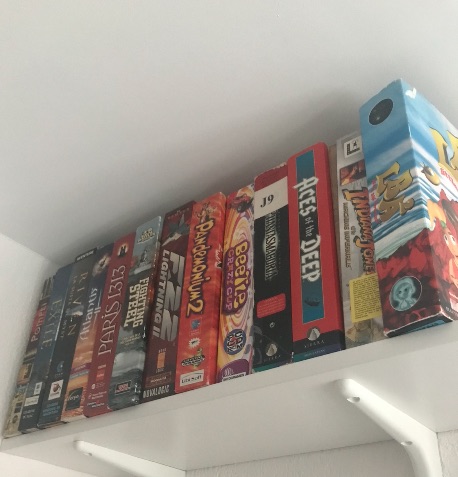
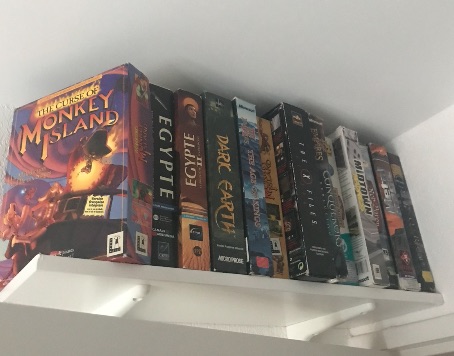
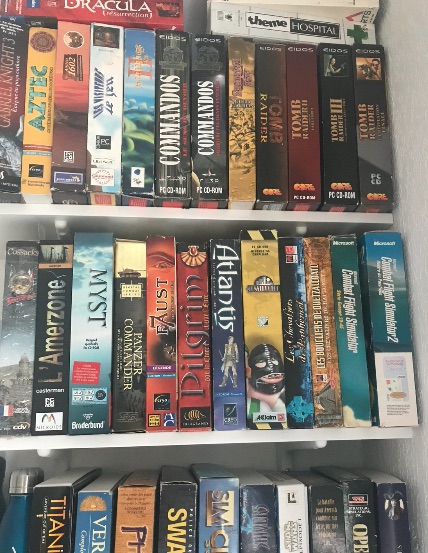
Above: my collection of big boxes. Still increasing. I only buy game I like or ones which I never tried but have good critics.
Nostalgia, it was and is still here
One of the recurrent matters that comes along in the gaming groups on Facebook is nostalgia. A lot have already been said about it, but it is still worth to explain things again.
A lot of players comment posts saying “I have so much good memories with that game […] I played it after school” or “I got it for Christmas when I was 12 and spent a lot of time on it. Great game!” Then, we can imagine these gamers or casual gamers to go to their parents' attic to get this gem they are talking about, and then trying to make it to run again on a modern computer (or buy the emulated version on the current generation console) and being disappointed to see that graphics and playability, or just the fun, are almost gone. Why that? Well, there are a few explanations.
• Our memories get altered over the years.
• Our brain trends to retain only good memories.
• Our judgments on these games are stored in the context, the era, when they were released, while when we play it again nowadays, we re-evaluate them with today criteria.
• Our memories on these games are often deeply linked to the personal context: childhood, adolescence, friends, a brother, a father, a place... This context is impossible to bring back, to recreate, and therefore playing again to these good old games without these environments has not the same taste, something is missing.
The good point is that a lot of us are aware of that. We play old games without considering the old graphics but enjoying the spirit of the games and, somehow, the spirit of the era when they were released. It is difficult to enjoy them without the context, but we still can do it, I do, I play mostly old video games.
Another thing: nostalgia is not related to video games, nor it is a trait of our era: I clearly remember older gamers, when I was a teenager, having the same judgment on the old stuff they were playing at in the middle of the 80’s.
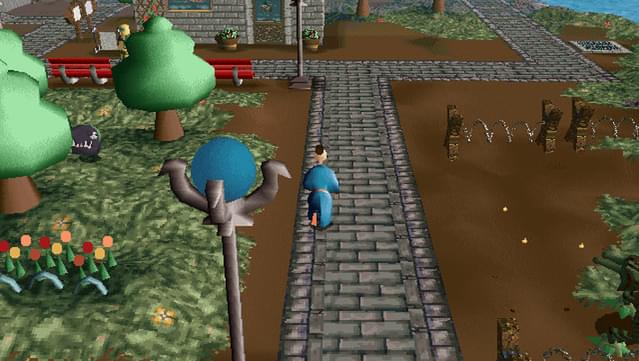
Above: the awesome Little Big Adventure 2 is forever linked into a specific part of my life and a specific place. I still enjoy this sometimes poetics adventure even if the controls are outdated.
Games are still considered stupid
« You on that thing again ?!” We all have heard that in our teenage years. My parents are educated people: a physician and a nurse. But they were, despite some efforts, IT illiterate people. They did not understand why we could spend so much time on a computer – not even speaking gaming a something, just facing the computer. For them (but ironically not my grandparents who were respectively a highly skilled engineer and daughter of another highly skilled engineer and to whom I owe the opportunity to have used a computer when I was a kid) these machines were designed for work and not for entertainment, and what we were doing with them was nothing less than stupid and by that we were wasting our time and our youth. My father told to one of my sisters once “What will you remember of your childhood? Spending so much time on a computer?” Today, I can answer “Yes, you’re right, and it was awesome!”
As a grown-up, I have been trying a lot, and I still do, to make them to understand that walking through the Versailles palace investigating how to dodge a conspiracy against Louis XIV in a fully reconstructed palace, with the support of the French Musée Nationaux was deeply an educating thing. I tried to make them to recognize that setting-up a strategy to defeat Genghis Khan in Ages of Empires 2 was clearly a brain exercise. I still repeat them that managing a company in Transport Tycoon Deluxe is fun AND educative. Well, to be honest, I have never been enough convincing.
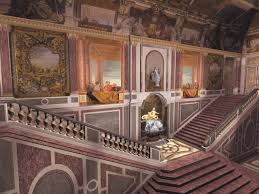
Above: the game Versailles is probably the most known of the series of educative/adventure games made by the french company Cryo.
And today? It seems that things have changed, but not so much. Some kids are lucky enough to have parents who know the power of video games and how they can enjoy it. But for other, being mainstream (I hate this word), video games are stupid and useless. However, I must recognize that sometimes their kids are not helping when they play ONLY at Battle Royale or soccer games (I like soccer) …
There is another thing for which I can’t blame them: the imagination. When I started playing in the early 90’s, I quickly understood that I liked simulations. One of them was Aces of the Deep, in which you were the captain of a German submarine during WWII. The graphics were not very developed, you spent mostly your time facing control panels and maps, but the game was realistic enough to make my brain to imagine what was visually missing, exactly what happens when you read a book. Today these kinds of games are so beautiful and visually accurate that not so much is left to our imagination.
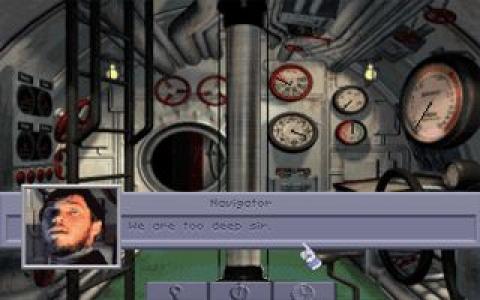
Above: Aces of the Deep.
Video games are still not considered as pieces of art.
It is somehow related to the previous point. Today, the humanity has produced hundreds of video games, some of them are garbage, but also a lot of them are pieces of our cultural heritage. Whether you’re looking at a LucasGames point and click of the early 90’s, at the second episode of Silent Hill released on PS2 in 2001 or at Zelda: The Wind Walker on GameCube of 2002, I still can’t understand how so many so-called intellectuals can despise this creativity. The scenario, the music, the ambiance, the artwork. I am sorry, this is pure art! I guess that if they had played at the Benoit Sokal’s Amerzone, they would have a different point of view.
I just mentioned the scenario aspect, I will insist on it. Sometimes, months, or even years before the early stage of development of a given game, someone has thought, and re- thought, about something innovative, sharp, daring. Two examples come to my mind
- American McGee’s Alice: the idea to continue the Lewis Caroll novel with Alice facing the troubles of adolescence is, to me, brilliant.
- Faust: Seven Games of the Soul is an interpretation of the Goethe’s novel Faust. This game got average critics. I found the story very interesting and daring, making me to be interested on this novel.
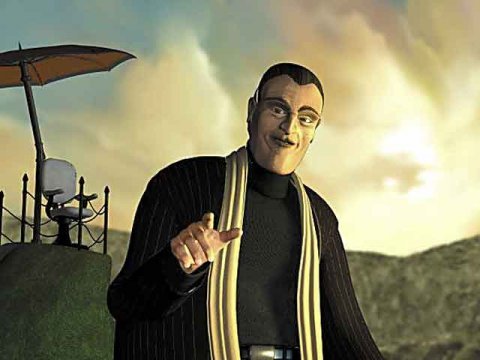
Above: in Faust, the player is asked by Mephistopheles to investigate and decide if the souls of seven persons are to be saved from damnation or not.
The video games industry couldn’t dodge the intergenerational clash, and it didn’t start yesterday (big subject)
Clashes, about any matter, between two generations, have always existed. Plato himself, and Socrate too, during the fifth century BC, complained about the youth being lazy and unworthy. This severe judgement is still applied today from one generation to the other (who have never heard an elder saying something like that?) Another thing that still exists is how the young ones laugh about their elders' old movies... and games.
It also applies to video games. Many examples come into my mind.
The previous generation stares at the current one with disgust
The first one. The N-1 generation does not like the new version of their favorite game that the N generations is about to enjoy. And this kind of assessment is not from yesterday. Back in 1999, I got from a friend a copy of the new Simcity 3000 (don’t laugh, by then having a free copy of a game was almost a nice gift as if you got the original one, because CD-R and recorders were expensive). I was very excited because I liked so much Simcity 2000. So, I played to the 3000, not as much, but enough to get the following opinion: it was a very good game, with the same spirit as its predecessors, but a little bit less fun than the 2000. However, in critics and everybody's (ie older players) mouth, this game was not good. They preferred the 2000, “way better”.
EDIT: some comments suggest that this clash does not exist, or at least that it is greatly exagerated.
Below: in my humble opinion, Simcity 3000 (bottom) was a good successor to the 2000 version (top)
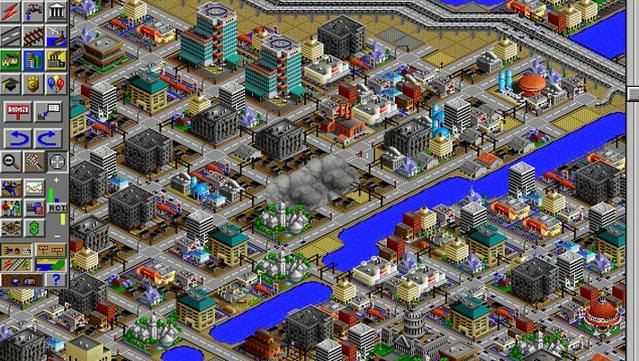
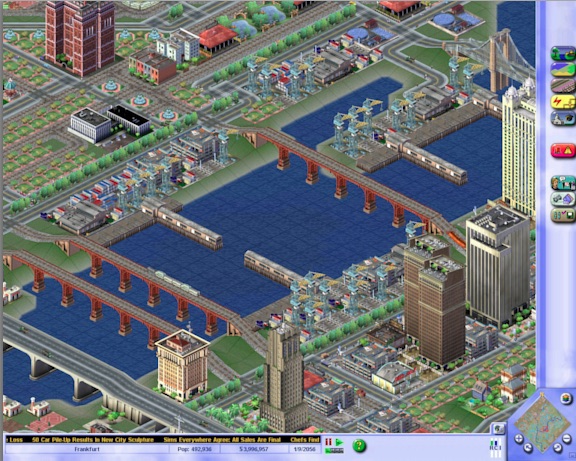
The cognitive bias
The second example could be related to a cognitive bias, the “survivor” one to be accurate. For those who don’t know it, one of the many explanations of this bias is that we estimate that things (car, buildings... or software) were better yesterday than today, or that the surviving one are survivors for some reasons – who are the wrong ones actually. But when we say this, we only assess the survivors. For instance, the nice buildings. We do not think about the large quantity of poorly designed buildings that are falling apart or had to be destroyed. The same bias applies to the software industry: we only judge the modern games we do not like and compare them to the very best one of our childhoods, not the ones who got a 40% rating back then.
This biased comparison between before and now could be illustrated with two practical examples:
• “Today games are expensive and empty”. I could reply: “Oh well I remember that in the 90’s you could spend the equivalent of 50 EUR to buy a racing game with only three cars and three races”.
• “Creativity has gone”. Black and White (2001) and Spores (2008) are perfect counterexamples.
EDIT: yes, those examples are not from yesterday. But I am sure that we can find more recent ones.
The young ones make fun of their elders
We also have heard at least on time a young fellow (sometime your own child) having fun about the old movies you like, the old singers, or the old video games. I have seen this kind of unpleasant situation a lot of times. One example was about Titanic: an adventure out of time. This game is great, the plot, the ambiance, but has some mistakes and limitations (of the time it was designed) with the interior's representation of the Titanic itself. Despite that, this game is still very enjoyable today. The comments I read from youngers about this game were totally unjustified, because according to them, it “too restrictive”, “unrealistic” or “the design is a joke “.
EDIT: same thing as above, some readers said that they have never read or hear this kind of comment. I personally did hear and read them a lot of times.
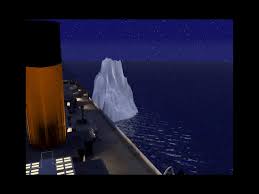
Above: For adventurers who have never tried it, I recommend Titanic by Cyberflix, just for the ambiance.
What is legitimate and what is not.
I could also add another example about the clash. Some players experience difficulties to understand that games are the product of their era. The style, the technical means, the game engine. Recently Ron Gilbert announced a new version of Monkey Island. A lot of gamers, claiming themselves as the legitimate ones because they were playing at the first one when it was released in 1991, decided that the selected design is not good. Guess what? The same thing happened when the third episode of the series was released with a cartoonesque design in 1997. Then same things three years later with the fourth episode with the characters in 3D. Each time, the developers used the design and the trends of their era, getting by the way a lot of “legacy” players who complained... but who bought the game in the end. The good point is that in the middle of this noisy arguments, there are players who can appreciate each opus for what they are (I am), as long as the spirit of the first games is retained. For instance, I like all the Monkey Island, even in the controls are awkward in the fourth episode, because the style and the spirit are still the very same that the ones of the first episode.
Those arguments, sharp, disrespectful (for the designers, developers, and other gamers) are also highlighting a defect well of our era this time: the lack of tolerance, or at the opposite, the idea of imposing a tolerance dangerous for the tolerance itself, from people mostly hidden behind their keyboard who do not accept differences of opinion. I personally got my part of the critics when I stated, a few years ago, that if I considered Gabriel Knight II as a good FMV adventure game, I thought that it was too serious and that the third episode was also a very good one and closer to the spirit of the first episode. People who did not get the same vision than me expressed it in a vehement way, stating that the 3D design was ruining everything (it reminds me the critics about Monkey Island IV in some way), sometimes with inappropriate words.
EDIT: a reader said that that there are not so much critics about the new design of the next episode of Monkey Island. If I agree that the insatisfied people are way more noisy than the ones who are happy, I did personally have a different experience on social media, with a lot of "acid" comments.
Below: I humbly think that GKIII (bottom) is closer to the first episode (top) regarding the ambiance and the sense of humor than the second episode (middle), despite being a very good game, is too serious in comparison to the first one.
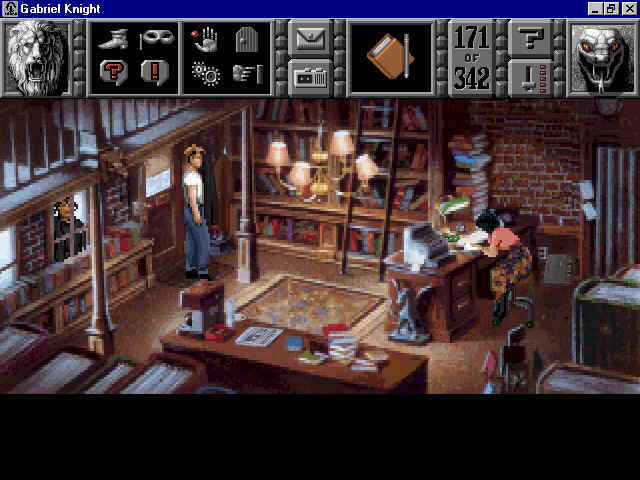

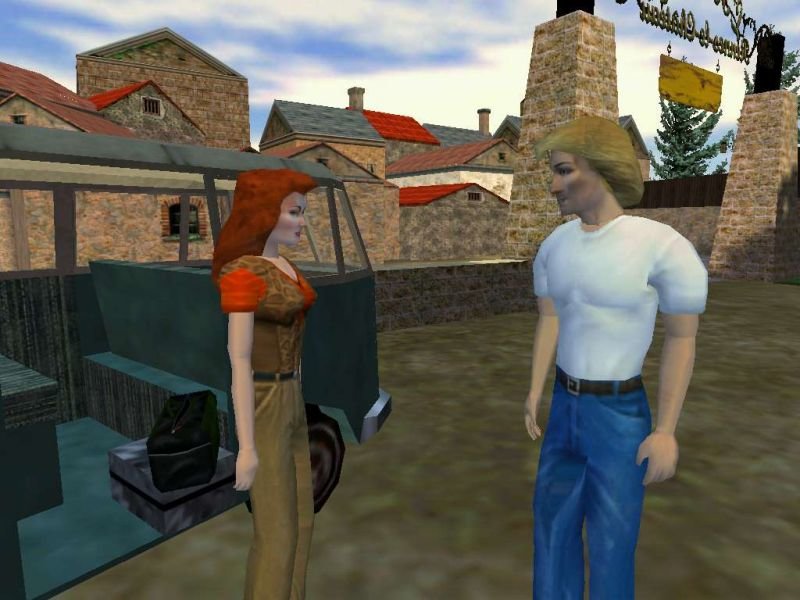
Fortunately, like some books, some games are timeless and will never age and reunite all the gamer generations
Conclusion
There is not conclusion. I will let the reader to its own because everything, in art, is subjective.
EDIT: the absence of conclusion seems to have triggered some reactions too :D
Cet article vous a plu? Découvrez d'autres articles :
- Introducing GMG: an application to manage your videogame collection publié le 25-06-2022
- JAW: a headless blog CMS publié le 26-05-2022
- What has changed in our relationship with video games over the last 25 years. And what has not. publié le 16-05-2022
- Gaming archeology: retro-engineering on Beasts and bumpkins publié le 25-04-2022
- Gaming archeology: retro-engineering on Ultimate Soccer Manager 98 publié le 17-04-2022
- PHP 8.1 : un petit exemple simple avec Fiber et CURL publié le 05-03-2022
- Les malheurs de la Sega Saturn : comment Sega a du cesser d'être un fabricant de console publié le 24-11-2021
- Saturn's misfortune: how Sega was forced to abandon console manufacturing publié le 26-09-2021
- Extract-Transform-Load : faire de l'ETL avec PHP publié le 15-06-2020
- Les helpers sont-ils anti-pattern? publié le 17-07-2018